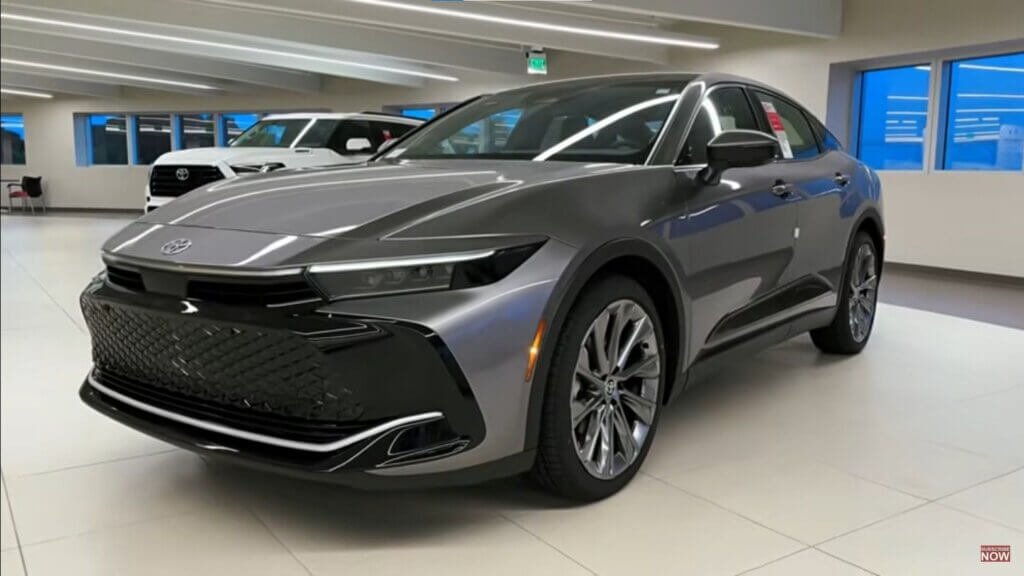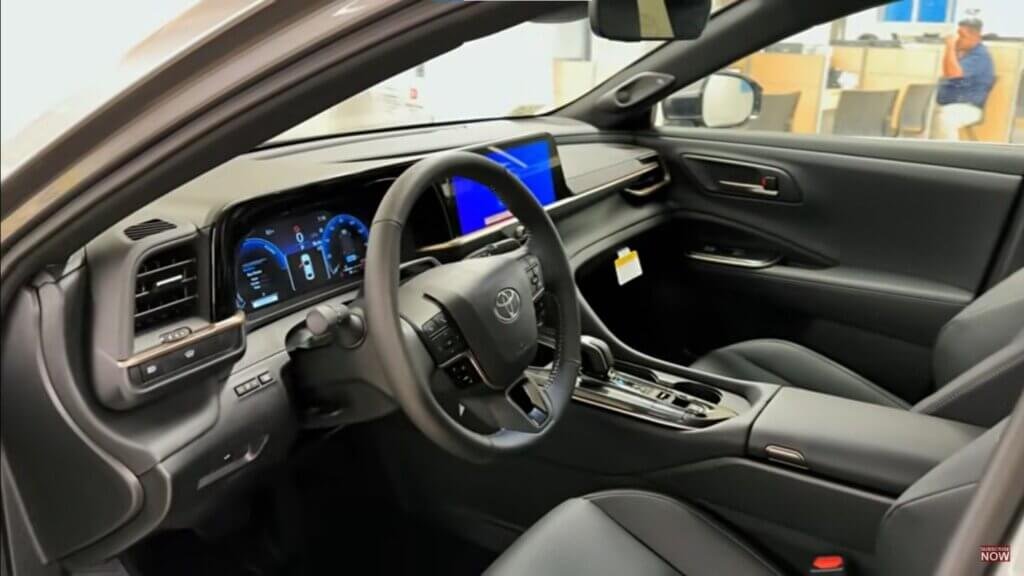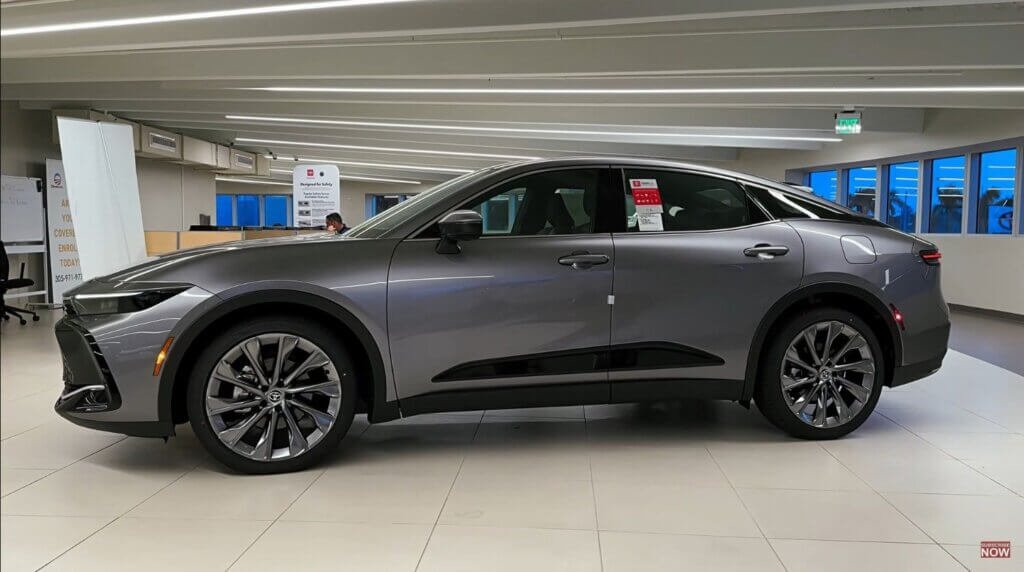Introduction: Toyota’s Bold Luxury Play
The automotive landscape is witnessing an interesting shift. Traditional non-luxury brands are increasingly stepping into luxury territory, blurring the lines between mainstream and premium offerings. The 2025 Toyota Crown stands at this fascinating intersection, representing Toyota’s most ambitious attempt to offer luxury without the luxury badge.
Replacing the venerable Avalon in Toyota’s lineup, the Crown brings a unique lifted-sedan profile, premium appointments, and advanced technology to the table. But the question remains: can a Toyota truly compete with established luxury marques like Lexus, Mercedes, and BMW? Let’s dive deep into what makes the 2025 Crown tick and whether it deserves consideration as a genuine luxury alternative.
The Crown’s Luxury Credentials: More Than Just a Name
The Crown nameplate carries significant heritage, having served as Toyota’s flagship sedan in Japan and other markets for nearly 70 years. While Americans may be less familiar with its royal lineage, the Crown has long represented Toyota’s pinnacle of comfort, technology, and prestige overseas.
The 2025 model continues this tradition with noticeably upscale exterior styling. Its distinctive silhouette—part sedan, part crossover—makes a bold statement that sets it apart from conventional luxury vehicles. Chrome accents, available two-tone paint treatments, and 21-inch machined alloy wheels add to its upmarket appearance.

Step inside and the luxury aspirations become more apparent. The cabin features soft-touch materials throughout, with genuine leather upholstery in higher trims and convincing synthetic leather in entry models. Real wood trim accents the dashboard and door panels, while ambient lighting creates a sophisticated atmosphere after dark.
Toyota has clearly paid attention to detail, with minimal panel gaps, substantial door closures, and effective sound insulation that creates a serene driving environment. According to automotive analyst Jessica Martinez of Motor Trend, “The Crown’s interior quality rivals entry-level luxury models from established premium brands, particularly in higher trim levels where material selection is nearly indistinguishable from Lexus offerings.”
Powertrains: Performance Meets Efficiency
Luxury isn’t just about leather and wood—it’s also about the driving experience. The 2025 Crown comes equipped with two hybrid powertrain options that balance performance and efficiency.
The standard setup combines a 2.5-liter four-cylinder engine with two electric motors and electronic all-wheel drive, generating a combined 236 horsepower. While adequate for daily driving, this base powertrain won’t set pulses racing.
For those seeking more spirited performance, the Crown Platinum and limited-edition models feature the Hybrid MAX system—pairing a turbocharged 2.4-liter four-cylinder with more powerful electric motors to produce 340 horsepower and 400 lb-ft of torque. This powertrain delivers a 0-60 mph time of approximately 5.7 seconds, putting it in league with entry-level luxury sport sedans.
Both systems offer impressive fuel economy for a vehicle of this size, with the standard hybrid achieving around 41 mpg combined and the more powerful Hybrid MAX still managing a respectable 30 mpg combined. This efficiency advantage represents one area where the Crown potentially outshines traditional luxury competitors.
The driving dynamics strike a balance between comfort and engagement. While not as athletic as German luxury sport sedans, the Crown offers composed handling, particularly in Platinum trim with its adaptive variable suspension. The ride quality impressively absorbs road imperfections without feeling disconnected or floaty—a characteristic often associated with proper luxury vehicles.
Technology: Feature-Rich Without Overwhelming
Modern luxury cars are technology showcases, and the Crown doesn’t disappoint in this regard. The dashboard is dominated by a 12.3-inch touchscreen infotainment system featuring wireless Apple CarPlay and Android Auto, natural voice recognition, and cloud-based navigation. This interfaces with an equally large 12.3-inch digital instrument cluster that’s customizable to display various information.
The Crown’s tech suite includes advanced driver assistance systems that rival luxury competitors. Toyota Safety Sense 3.0 provides adaptive cruise control with lane-centering, automatic emergency braking with pedestrian detection, blind-spot monitoring, and rear cross-traffic alert as standard equipment. Available automated parking assistance and a 360-degree camera system further enhance the premium experience.
Audiophiles will appreciate the available 11-speaker JBL premium sound system, which delivers crisp, immersive audio that competes favorably with entry-level premium audio systems from luxury brands. Wireless charging, heated and ventilated seats, a panoramic sunroof, and a head-up display round out the tech offerings expected in the luxury segment.
However, the Crown’s interface design and user experience, while functional and intuitive, lack some of the visual polish and customization options found in established luxury vehicles. According to Consumer Reports’ vehicle testing department, the system prioritizes functionality over flashiness—which some may prefer, while others might find it less emotionally engaging than luxury-brand alternatives.
Comfort and Space: A True Luxury Strength
Where the Crown truly shines as a luxury alternative is in passenger comfort. The elevated seating position—higher than a conventional sedan but lower than an SUV—offers easy ingress/egress and good visibility without sacrificing aerodynamics or the driving feel of a sedan.

Front seats are exceptionally comfortable for long journeys, with multiple adjustment options and supportive cushioning. Rear-seat accommodations are similarly impressive, with abundant legroom and headroom that exceed many dedicated luxury sedans. The slightly elevated roof line compared to traditional sedans pays dividends in interior spaciousness.
Noise suppression deserves special mention. Toyota engineers have employed extensive sound insulation, acoustic glass, and active noise cancellation to create a remarkably quiet cabin. Road and wind noise are well-controlled even at highway speeds, and the hybrid powertrains operate with minimal intrusion.
Trunk space is adequate though not exceptional at 15.2 cubic feet. The battery placement compromises some cargo capacity compared to conventional sedans of similar exterior dimensions, but the available space is well-shaped and usable.
The Luxury Experience: Beyond the Spec Sheet
Luxury isn’t just about features and specifications—it’s about the overall ownership experience. Toyota has made efforts to elevate the Crown experience beyond the typical Toyota purchase and service process.
Crown buyers receive complimentary maintenance for the first two years or 25,000 miles, including oil changes, tire rotations, and multi-point inspections. While this falls short of some luxury brands’ more comprehensive service packages, it represents a step up from standard Toyota offerings.
The warranty coverage, however, remains typical Toyota: 3-year/36,000-mile basic and 5-year/60,000-mile powertrain protection, plus 8-year/100,000-mile coverage for hybrid components. Most luxury brands offer at least 4-year/50,000-mile basic coverage, giving them an edge in this aspect of ownership peace of mind.
Where Toyota cannot match established luxury brands is in dealer experience. Despite efforts to create special Crown displays and trained product specialists at dealerships, the typical Toyota showroom environment lacks the upscale amenities, personalized attention, and premium service loaners commonly found at dedicated luxury brand facilities.
According to J.D. Power’s 2024 Dealer Experience Study, this remains one of the most significant differentiators between mainstream and luxury brands, regardless of product quality or features.
Price Positioning: The Value Proposition
Perhaps the Crown’s strongest argument as a luxury alternative comes down to value. The 2025 Crown starts around $40,000 for base XLE models and tops out near $55,000 for fully-equipped Platinum trim—positioning it significantly below similarly-sized and similarly-equipped vehicles from established luxury brands.
When comparing a fully-loaded Crown Platinum against entry-level midsize luxury sedans like the Mercedes E-Class, BMW 5-Series, or even Toyota’s own Lexus ES, the Crown typically delivers equal or greater feature content, similar interior space, and comparable build quality for thousands less.
This value proposition becomes even more compelling when considering long-term ownership costs. Toyota’s legendary reliability record suggests the Crown should maintain excellent dependability, while hybrid powertrains historically demonstrate exceptional durability and lower maintenance requirements than conventional luxury powertrains.
Depreciation patterns also favor the Crown as a value-conscious luxury alternative. While established luxury brands typically experience steeper depreciation in the first three years of ownership, Toyota products generally retain value better, reducing the true cost of ownership over time.
Pros and Cons: Weighing the Crown as a Luxury Alternative
The Crown offers several compelling advantages as a luxury alternative. Its exceptional comfort, impressively quiet cabin, and comprehensive technology suite deliver much of what luxury buyers seek. The hybrid powertrains provide a smooth, refined driving experience with excellent fuel economy. Build quality is outstanding, and the value proposition is difficult to ignore when comparing feature-for-feature against established luxury models.

However, several factors work against its luxury credentials. The Toyota badge lacks the prestige and social status of dedicated luxury brands—a significant consideration for many luxury buyers. The dealer experience falls short of luxury standards, and some interior materials, while high-quality, don’t quite match the tactile perfection of the best luxury offerings. Performance enthusiasts may find even the more powerful Hybrid MAX system lacking the driving engagement of dedicated sport sedans from European luxury brands.
Alternatives and Comparisons: The Crown’s True Competition
The Crown occupies an interesting middle ground between mainstream and luxury markets. Its most direct competitors aren’t necessarily traditional luxury vehicles but rather other “premium mainstream” offerings like the Nissan Maxima, Chrysler 300, and Volkswagen Arteon.
Among dedicated luxury brands, the Lexus ES represents the closest comparison, sharing some underlying engineering with Toyota products but wrapped in more overtly luxurious packaging with the full luxury dealer experience. The Genesis G80 offers another interesting comparison point as a value-oriented luxury alternative that has successfully carved out its niche.
Where the Crown potentially outshines these competitors is in its unique positioning—not quite sedan, not quite SUV—and its efficient hybrid powertrains, which remain relatively rare among luxury offerings outside of much more expensive models.
Frequently Asked Questions
How does the 2025 Toyota Crown compare to a Lexus ES in terms of luxury features?
The Crown and Lexus ES share many underlying components and technological features, but differ in execution. The Crown offers comparable interior space, similar technology features, and equivalent power in Hybrid MAX form. The Lexus ES edges ahead in terms of interior materials in some areas, offers a more comprehensive warranty, and provides the full luxury dealer experience. The price difference—roughly $5,000-7,000 for similarly-equipped models—essentially pays for the Lexus badge, slightly more upscale materials, and the luxury dealership experience.
Will the Toyota Crown hold its value better than luxury competitors?
Historical data suggests the Crown should maintain better resale value than most European luxury competitors. Toyota products typically experience less depreciation than luxury brands, especially in the critical first three years of ownership. The hybrid powertrain further supports value retention, as hybrid vehicles have shown strong resale performance in recent years due to their efficiency and proven reliability. While the Crown may not hold value quite as well as Toyota’s more established models with longer track records, it’s likely to outperform most dedicated luxury offerings in depreciation metrics.
Is the Crown’s unique body style practical for everyday use?
The Crown’s distinctive “lifted sedan” profile offers practical advantages for daily living. The slightly elevated seating position provides easier entry and exit than conventional sedans—particularly beneficial for older drivers or those with mobility concerns. This design also improves outward visibility without sacrificing the driving dynamics and fuel efficiency advantages of a sedan. The conventional trunk provides security for valuables that an SUV’s open cargo area doesn’t offer, though it lacks the flexibility of folding rear seats found in many competitors.
How reliable is the Toyota Crown compared to luxury vehicles?
While the current generation Crown has limited long-term reliability data in the North American market, Toyota’s overall reputation for building dependable vehicles suggests the Crown should offer superior reliability compared to most luxury competitors. The hybrid powertrains utilize Toyota’s extensively proven hybrid technology, which has demonstrated exceptional reliability across millions of vehicles. Consumer Reports has given the Crown above-average predicted reliability ratings based on Toyota’s track record and the relatively mature technology employed throughout the vehicle.
Conclusion: A Compelling Alternative, With Caveats
Is the 2025 Toyota Crown a true luxury alternative? The answer depends largely on how you define luxury and which aspects matter most to you.
For buyers who prioritize comfort, quietness, build quality, technology, and value, the Crown delivers a genuinely luxurious experience that rivals or exceeds many dedicated luxury vehicles costing thousands more. Its efficient hybrid powertrains offer a refined driving experience with exceptional fuel economy that many luxury brands can’t match without moving to much higher price points.
However, for those who view luxury through the lens of brand prestige, the ultimate in material quality, or the complete white-glove dealer experience, the Crown will fall short of expectations. No matter how refined the product, the Toyota badge doesn’t carry the same social status as established luxury marques.
Perhaps it’s best to view the Crown not as a luxury impersonator but as something different altogether—a premium vehicle that prioritizes substance over status, delivering the functional elements of luxury without asking buyers to pay for the intangibles of brand prestige. For the value-conscious luxury seeker, that proposition makes the 2025 Toyota Crown worthy of serious consideration.
Looking for more automotive insights? Check out our recent posts on TillDrive.com.

